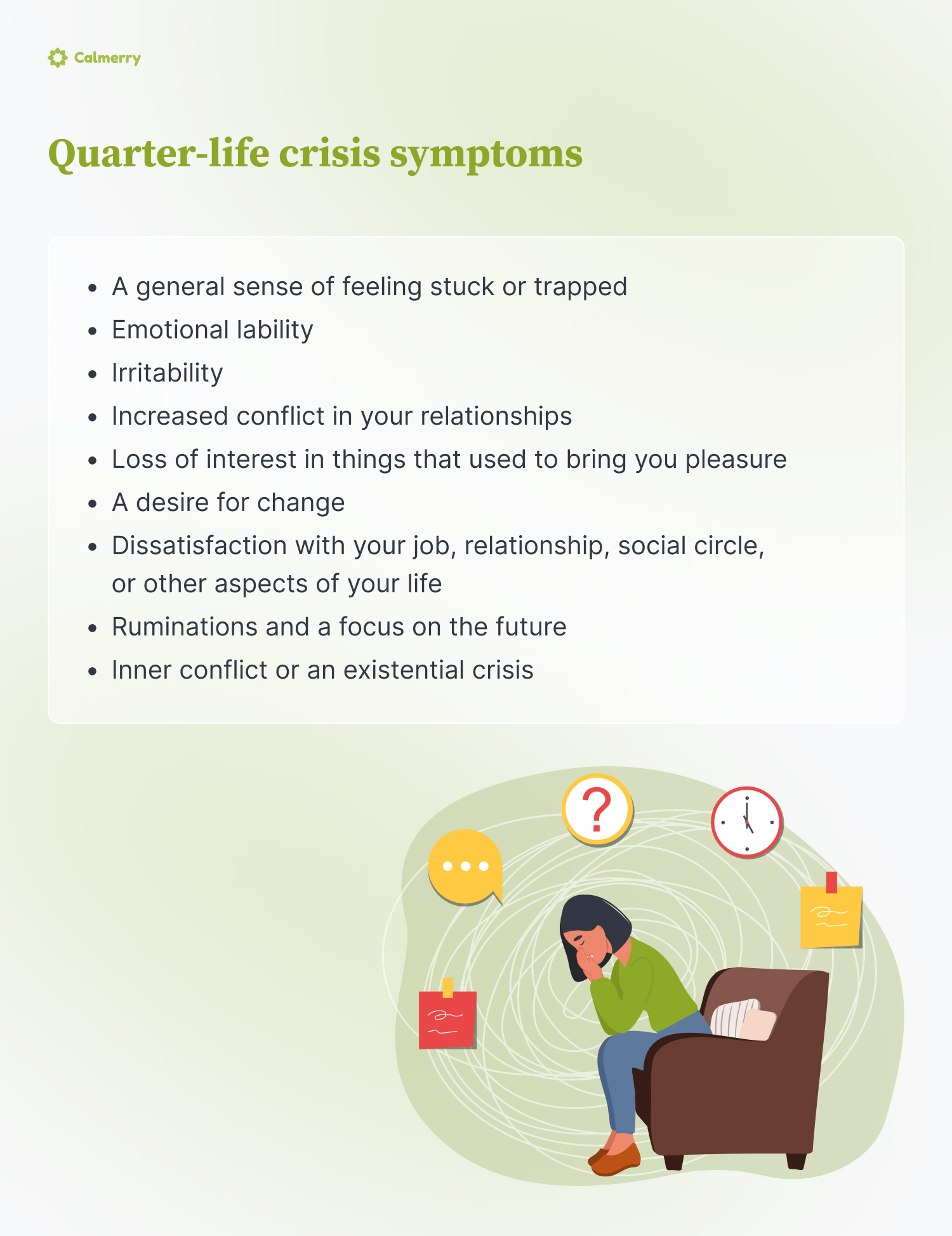Understanding and Overcoming a Quarter-Life Crisis

In this article
Quarter-life can be a time of hope and promise. In so many ways, the world is your oyster.
But why, then, are so many twenty-somethings feeling overwhelmed, depressed, lonely, and pressured? [1] Kessler, R. C., Amminger, G. P., Aguilar‐Gaxiola, S., Alonso, J., Lee, P., & Üstün, T. B. (2007). Age of onset of mental disorders: a review of recent literature. Current Opinion in Psychiatry, 20(4), 359–364. https://doi.org/10.1097/yco.0b013e32816ebc8c Cue the quarter-life crisis.
What is a quarter-life crisis?
The famous midlife crisis pervades popular imagination – empty nesters feeling compelled to relive their glory days while facing the harsh realities of lost identities, aging parents, and family transitions.
But the less discussed quarter-life phase can also carry a heavy psychological load.
This is a time when many people are continuing to unmerge from their parents, establish their adult relationships and careers, and figure out what kind of life they want to live.
Many people are also facing these transitions amidst broader challenges, such as mounting student debt, economic turmoil, climate anxiety, loneliness, feeling lost, and navigating unexpected twists and turns such as the global pandemic. [2] Byock, S. D. (2015). The Inner world of the first half of Life: analytical psychology’s forgotten developmental stage. Psychological Perspectives, 58(4), 399–415. https://doi.org/10.1080/00332925.2015.1092758
All these life changes and stressors can lead to a period of overwhelm, which some have termed the “quarter-life crisis.”
One way to think about the quarter-life crisis is to break it down into four stages:
- Having a sense of being trapped in a relationship, job, or home that is not aligned with your true desires
- Leaving the above situation and then being confronted with feelings of emptiness or loneliness
- Reconciling your goals and values with the ways that you are currently living, exploring new interests, building a community, and finding your way
- Finding a sense of clarity and groundedness [3] Zilca, R. (2017, July 20). Why your late twenties is the worst time of your life. Harvard Business Review. https://hbr.org/why-your-late-twenties-is-the-worst-time-of-your-life
This process can last for many years, and it can also cycle around and around. It can feel painful and overwhelming. And it can also offer an opportunity to step back, reflect, and live in a way that feels aligned and connected with who you really are.
– Kate Dubé, Licensed Clinical Social Worker (LCSW)
Is a quarter-life crisis real?
While being in your twenties can be fun and freeing – it can also be isolating and overwhelming. During this life phase, many people are given increased responsibilities at work, living on their own for the first time, and taking charge of their lives from the time they wake up to the time they go to bed.
This “in-between” period – not quite kid and not quite adult – can lead to an inner sense of confusion and suffering. In fact, some research has found that the average age for the onset of depression has shifted to a person’s mid-twenties rather than their early fifties as it used to be. [3] Zilca, R. (2017, July 20). Why your late twenties is the worst time of your life. Harvard Business Review. https://hbr.org/why-your-late-twenties-is-the-worst-time-of-your-life
If you’re in this boat, some of what’s causing your distress may have to do with your expectations not matching your reality. For example, you may have a long list of “shoulds” – by the time I reach quarter-life:
- “I should be married”
- “I should make X amount of money”
- “I should be at X point in my career”
You may feel a profound sense of disappointment if you don’t reach these benchmarks in your expected timeframe. Some of it may also be more subtle. Perhaps you feel you should know yourself better, feel more confident, or have a more solid community of friends.
Social media can exacerbate these feelings of failure when your life doesn’t manifest in a way where all your “shoulds” come true. It can appear as though everyone else is living the ideal life on the ideal timeline with their curated social media feeds.
At what age is a quarter-life crisis?
Because the quarterlife crisis is not a clinical or universally agreed-upon experience – there is no exact age range or defining set of circumstances to draw from.
In her book, “Quarterlife: The Search for Self in Early Adulthood,” author Satya Doyle Byock writes about the quarterlife encompassing the ages of 16 to 36. [4] Castillo, E. (2022, October 12). Portland author’s ‘Quarterlife’ explores the period between adolescence and midlife. Opb. https://www.opb.org/quarterlife-book-early-adulthood-guidance/
The quarter-life is also sometimes discussed as a later life phase. For example, researcher Dr. Oliver Robinson from the University of Greenwich in London writes that “quarter-life crises don’t happen literally a quarter of the way through your life,” but rather that “they occur a quarter of your way through adulthood, in the period between 25 and 35.“ [5] Hill, A. (2018, February 14). The quarterlife crisis: young, insecure and depressed. The Guardian. https://www.theguardian.com/quarterlife-crisis-young-insecure-depressed
And yet other researchers from the University of Pennsylvania and the United Kingdom write that the quarter-life crisis (QLC) is a popular term for developmental crisis episodes that occur during early adulthood from ages 18 to 30 years old. [6] Agarwal, S., Guntuku, S. C., Robinson, O., Dunn, A., & Ungar, L. H. (2020). Examining the phenomenon of Quarter-Life crisis through artificial intelligence and the language of Twitter. Frontiers in Psychology, 11. https://doi.org/10.3389/fpsyg.2020.00341
How long does a quarter-life crisis last?
Again, without a universal definition of the quarter-life crisis, there is also no set term or timeframe for this experience.
That said, research presented at the British Psychological Society Annual Conference in Glasgow found that among more than a thousand surveyed young people:
- Almost 9 out of 10 reported feeling under pressure to succeed in their relationships, finances, and jobs before the age of 30
- 2 of every 5 were worried about their finances
- Almost one-third felt under pressure to marry and have children before hitting 30
- And more than 2 of every 5 reported wanting to change careers [5] Hill, A. (2018, February 14). The quarterlife crisis: young, insecure and depressed. The Guardian. https://www.theguardian.com/quarterlife-crisis-young-insecure-depressed
This time of pressure and overwhelm was found to last, on average, for two years.

Quarter-life crisis symptoms
In addition to the four phases listed above, if you’re experiencing a quarter-life crisis, you may notice:
- A general sense of feeling stuck or trapped
- Emotional lability
- Irritability
- Increased conflict in your relationships
- Loss of interest in things that used to bring you pleasure
- A desire for change
- Dissatisfaction with your job, relationship, social circle, or other aspects of your life
- Ruminations and a focus on the future
- Inner conflict or an existential crisis
Who is most likely experiencing a “quarter-life crisis?”
Anyone can experience a period of questioning and personal evolution. However, people who may be particularly likely to experience a quarter-life crisis include those who are:
- Unsatisfied with their work or career path
- Questioning their relationships, experiencing romantic turmoil, or set on finding a life partner
- Experiencing a life transition such as graduating from college or graduate school, getting married, going through a breakup, moving, or having children
- Facing financial challenges such as debt or rising costs of housing
- Doubting their overall set of values to guide them through life
How to deal with a quarter-life crisis
If you’re in your 20s and are experiencing a time of questioning, confusion, or disconnection from yourself and your life, this may be part of your normal developmental transition into adulthood.
But slowing down and navigating through this challenging phase with a sense of groundedness and presence can make all the difference in how you respond and recover.
– Kate Dubé, Licensed Clinical Social Worker (LCSW)
Below are six ways that you can support yourself through your quarter-life crisis.
1. Cover your basics
I’ve said it before, and I’ll say it again: there’s no better thing that you can do for your mental health than make sure you are getting enough sleep, eating nourishing food, spending time with people who uplift you, and moving your body on a regular basis.
2. Journal it out
When you don’t know yourself or what is at the root of your feelings, you’ll feel forever perplexed by your shifting emotional states.
Journaling is a great way to reflect on your life and how you process and make sense of it.
Writing can also help you tap into your inner wisdom, build your self-awareness, and explore parts of your psyche that have otherwise been blocked off.
3. Know when to call on yourself rather than calling on others
Transitioning from dependence to independence can be a drawn-out process that you may never fully complete. What is independence anyway when we live in such an interconnected society and world?
Even still, there can be something transformative in learning to feel confident in yourself and learning to rely on yourself.
4. Explore meaning in your life
Finding a sense of meaning is a daunting task. But less so if you can break it down into smaller chunks. [7] Three ways to see meaning in your life. (n.d.). Greater Good. https://greatergood.berkeley.edu
Researchers have postulated three intertwining pathways toward living a meaningful life:
- Coherence: Or developing a narrative around what has happened in your life and how it all fits together.
- Purpose: Or the recognition of the “why” behind your actions
- Significance: Or the sense that your life matters and you are of value.
5. Connect with your community
Loneliness and isolation can be powerful blockades in the process of growing through your quarter-life crisis.
Even if you don’t feel up to socializing, try to maintain connections with the people you trust and who make you feel seen and valued. And you never know, they might be going through something similar.
– Kate Dubé, Licensed Clinical Social Worker (LCSW)
6. Try therapy
Life’s different now than it was when previous generations were in their 20s. While you might have opportunities that your parents never had, you may also compare your accomplishments to theirs or feel as though you are not living the life you should be living by this age.
Therapy can be a powerful space to check in with yourself, process your experiences, and discover your own unique path.
In other words, in-person or online therapy can help you navigate your quarter-life crisis and get to the other side, feeling more in touch with who you are, who you want to spend your time with, and how you want to shape your life.
A word from Calmerry
At Calmerry, we’re here to provide a compassionate and understanding ear. Our therapists are well-versed in the unique challenges of a quarter-life crisis, offering a space where you can freely explore your feelings and aspirations.
You can find clarity and direction. Start with a brief survey to get matched with your expert within 1 hour.
Kessler, R. C., Amminger, G. P., Aguilar‐Gaxiola, S., Alonso, J., Lee, P., & Üstün, T. B. (2007). Age of onset of mental disorders: a review of recent literature. Current Opinion in Psychiatry, 20(4), 359–364. https://doi.org/10.1097/yco.0b013e32816ebc8c
Byock, S. D. (2015). The Inner world of the first half of Life: analytical psychology’s forgotten developmental stage. Psychological Perspectives, 58(4), 399–415. https://doi.org/10.1080/00332925.2015.1092758
Zilca, R. (2017, July 20). Why your late twenties is the worst time of your life. Harvard Business Review. https://hbr.org/why-your-late-twenties-is-the-worst-time-of-your-life
Castillo, E. (2022, October 12). Portland author’s ‘Quarterlife’ explores the period between adolescence and midlife. Opb. https://www.opb.org/quarterlife-book-early-adulthood-guidance/
Hill, A. (2018, February 14). The quarterlife crisis: young, insecure and depressed. The Guardian. https://www.theguardian.com/quarterlife-crisis-young-insecure-depressed
Agarwal, S., Guntuku, S. C., Robinson, O., Dunn, A., & Ungar, L. H. (2020). Examining the phenomenon of Quarter-Life crisis through artificial intelligence and the language of Twitter. Frontiers in Psychology, 11. https://doi.org/10.3389/fpsyg.2020.00341
Three ways to see meaning in your life. (n.d.). Greater Good. https://greatergood.berkeley.edu
online therapy
live video session



